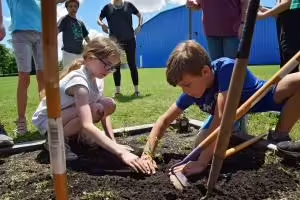LEWISTOWN, Ill. - University of Illinois Extension staff from horticulture, Supplemental Nutrition Assistance Program—Education (SNAP-Ed), and 4-H teamed up to provide training to teachers, administrators, parents, and master volunteers with the goal to help them understand how to start and maintain a school garden. The four-session series, held October 2019 through March 2020 attracted 20 people from 15 different organizations.
“A school garden can impact a student’s academic learning by providing opportunities for hands-on learning,” stated Nicole Flowers-Kimmerle, University of Illinois horticulture educator in the Fulton-Mason-Peoria-Tazewell Unit. A garden at a school allows students to apply what they learn in class to a “real-world” situation. Connections to subjects such as math, science, art, history, and language arts can all be investigated in a garden. “Studies also show that school gardens also provide better nutrition because students that garden are more likely to eat the daily recommendation of fruits and vegetables,” noted Nicole.
In this series, Extension educators along with Extension Master Gardeners provided information about the nuts and bolts of growing plants from seeds to harvest, garden curriculum and nutrition, how schools can use gardens to meet the current Common Core and Next Generation Science Standards, and how to design gardens with children in mind. Other topics discussed during the training included planning the garden, places to look for funding, and recruiting and training volunteers to help maintain the garden.
Spring Lake school is an Extension partner through the SNAP-Ed program. They have had a school garden for several years. “The Spring Lake school garden offers a unique learning opportunity for both the students and their families. Students are able to learn science, nutrition, and gardening lessons outside of the classroom while enjoying the products of the labor in the lunchroom,” explained Kaitlyn Streitmatter, SNAP-Ed educator.
Youth gardens have been a part of Extension programs through 4-H which focuses on youth development; SNAP-Ed which focuses on nutrition; and horticulture which focuses on gardening skills. By coming together to provide this training, participants were able to learn how students can benefit from a school garden within all of these areas. “There are so many benefits that can be gained through a school garden,” mentioned Nicole. “Our goal with this training was to synergize our areas of expertise and help as many people as we can, feel confident that they can start and maintain a school garden on their own.”
New school gardens may be delayed due to schools moving to distance learning shortly following the training. However, the participants now have the information they need to implement school gardens at both public and private institutions in Fulton, Mason, Peoria, and Tazewell counties.
Extension offers a wide variety of research-based information and programs. To learn more visit extension.illinois.edu/fmpt.
Source - Nicole Flowers-Kimmerle, horticulture educator
